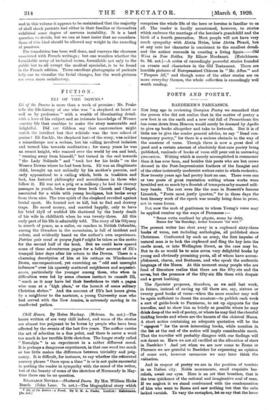FICTION.
ELI OF THE DOWNS.* Eli of the Downs is more than a work of promise : Mr. Peake tells the life-history of one who was " a shepherd at heart as well as by profession " with a wealth of illuminating detail, with a love of his subject and an intimate knowledge of Wessex country life that combine to make the story memorable and delightful. Did tot Gibbon say that conversation might enrich the intellect but that solitude was the true school of genius ? Eli Buckle, the shepherd hero of the story, was neither a misanthrope nor a recluse, but his calling involved isolation and turned him towards meditation ; for many years he was an errant knight, who roamed over the world by sea and land, " running away from himself," but turned in the end towards " the Lady Solitude " and " took her for his bride " on the Wessex Downs where he had been born. Eli was an illegitimate child, brought up not unkindly by his mother's parents, and early apprenticed to a. calling which, both in. tradition and fact, has fostered philosophy and mercifulness in those who follow it. Eli was not a prig or a milksop ; he had his stormy passages in youth, broke away from both Church and Chapel. associated for a while with young hooligans, but broke away from them also. The true spirit of the shepherd revolted against brutal sport. He hunted not to kill, but to find and destroy traps. He saved money, and married happily, only to have his brief idyll of wedded life shattered by the lonely death of his wife in childbirth when he was twenty-three. All this early part of his life is admirably told. The story of his Odyssey in search of peace, as a sailor, on ranches in British Columbia, among the Siwashes in the mountains, is full of incident and colour, and evidently based on the author's own experiences. Patriae quis exsul se guogue flit* It might be taken as the motto for the second half of the book. But we could have spared some of these adventurous pages for a fuller account of Eli's tranquil later days after his return to the Downs. There is a charming description of him at his cottage on Winoheombe Down, uncompanioned, yet exercising an "odd and unsought influence" over his sparsely scattered neighbours and acquaint- ances, particularly the younger among them, who when in difficulties were led by some obscure instinct to consult Eli, " much as it may have led thole forefather, to visit a pagan wise man at a 'high place,' or the hermit of some solitary Christian shrine." And the account of Eli's last hours given by a neighbour to the narrator, a young University man who had served with the New Armies, is extremely moving in its unaffected pathos.










































 Previous page
Previous page